Olympic Diary: Excellent Planning Results in Quality Streaming
A column on ZDNet last week suggested that the 2012 Summer Olympics 'might melt the internet.' For that writer, and anyone concerned about all that melting, here's some interesting news.
Its now 7:30 AM on the morning after the London 2012 XXX Olympics have opened (yes XXX = 30 in Latin numerals) and after a brief on-routine wake up, my kids have fallen back to sleep after a late night of festivities -- and so has the misses.
So its time for a quick scour over all the traffic monitors I can hustle up to see what the impact on the net was given the live coverage of the ‘most connected Olympics ever.'
And my first impression is two-fold:
- There is no noticeable impact (!)
- This indicates excellent planning by the content providers (principally the BBC) and the CDNs
Here's the data I have mustered (and be aware that some is still being analysed:
This is the London Internet eXchange (LINX) traffic for the week. As you can see there is no noticeable increase in traffic. In fact, the traffic looks slightly down on the rest of the week.
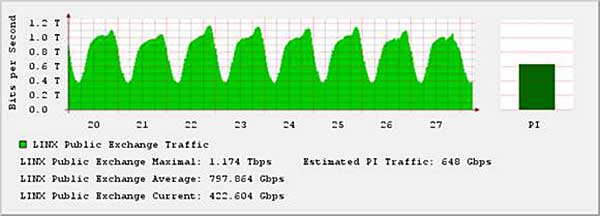
Here are a couple of graphs from Google. First, a graph for all products. It looks to me like there is, if anything, a significant dip while folks stopped surfing and instead watched broadcast.
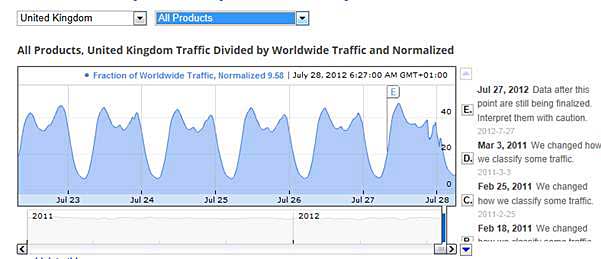
Second, a graph showing YouTube's traffic, which largely mirrors the ‘all products' graph above.
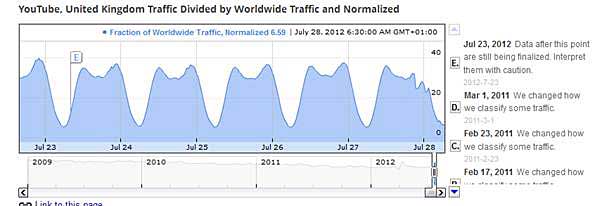
Here's a global traffic index from Internet Traffic Report, which does show a trend upwards, but no obvious spike last night.
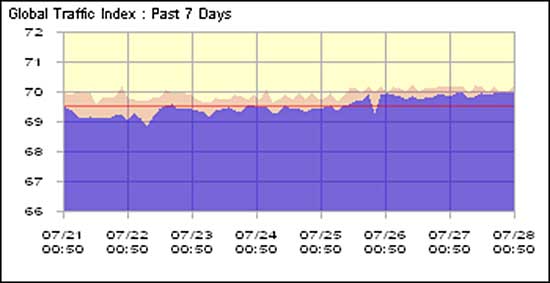
And finally, this other graphic showing response time to a typical U.K. ISP from the Internet Traffic Reports demonstrates an interesting ‘flat space' during the build up to the event and then a couple of ‘well within normal' spikes of increased latency during the event.
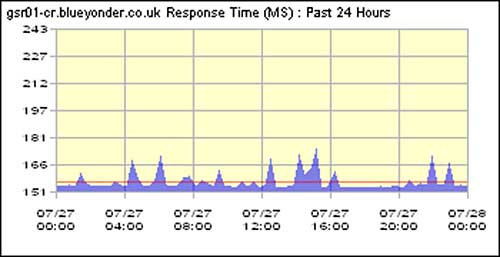
After a little more searching I haven't been able to quickly find any other useful public data, so I sent a note to the guys at the BBC who are coordinating delivery.
Over the weekend I got some replies: The BBC's corporate communications teams haven't okayed a release of any figures yet, but I have been given word that I will be given stats as soon as any become available. The line so far is that it 'has been a good start with some healthy stats and high quality streaming,' but we will just have to wait to get anything more quantitative than that.
My impression is that a combination of time-delay playback globally coupled with excellent planning domestically, as well as widespread, easily accessible broadcast coverage left the networks running absolutely as normal despite the increased demand.
My guess is that at this stage at least the pirate content is showing little impact because of the large volume of free legal content, and the legal content has been provisioned for well.
I'll provide further updates as I get them.
Related Articles
European rightsholder marks first Olympics coverage with major social media, mobile and interactive overhaul.
30 Oct 2017
Cellular video multiplexing technology has radically transformed the way the London 2012 events are covered, giving viewers video of action that would have gone completely unnoticed in previous games
08 Aug 2012
The numbers so far might not be Royal Wedding-sized, but when you consider the number of streams being viewed by the number of viewers, the figures are staggering
07 Aug 2012
Impressed with the success of the BBC's streaming of London 2012—and eager to raise more money by selling off radio spectrum—the UK House of Lords pushes for OTT to replace OTA entirely
02 Aug 2012
Created specifically for the Olympics, Haivision and iStreamPlanet's GoLive service offers an end-to-end solution from signal acquisition to player
19 Jul 2012
From the BBC to broadcasters in Germany, France, Spain, and across Europe, the online video coverage of the 2012 London Olympics will be unlike any other streaming event you've seen
18 Jun 2012
Deltatre, the company supplying data services to the BBC and NBCOlympics.com for the London games, says online viewership will almost certainly pass a half billion, and may approach one billion.
18 Apr 2012